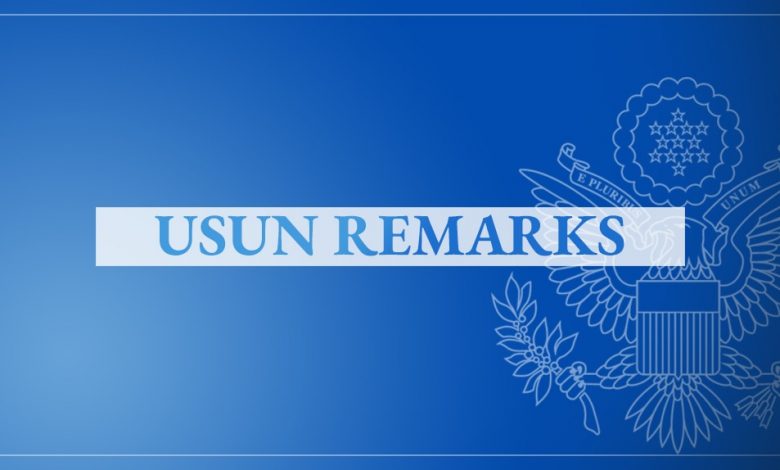Explanation of the position on the Agreed Conclusions of the Commission on the Status of Women of 2023

Sofia Korac
Advisor for economic and social affairs
New-York, New-York
March 18, 2023
AS DELIVERED
Thank you, Madam Chair and Madam Executive Director.
The United States would like to thank the Permanent Representative of Argentina, Ambassador Squeff, for making the Agreed Conclusions possible, and special thanks to your wonderful team and our wonderful and steadfast colleagues, Pilar and Flor. Your colleagues on the Gender Committee and the Third Committee are so grateful to you.
The United States is deeply concerned about the Commission’s current working methods. The United States would have liked to have adopted these conclusions a few hours ago and had had the appropriate time to review the text. Negotiations on this text stalled over non-German issues that were not agreed, and more importantly, improving the status of women and girls.
We have sacrificed much, including the top priorities of my delegation and many other delegations, including last-minute deletions of paragraphs containing some of these important elements, including references to multiple and overlapping forms of discrimination and sexual and reproductive health.
To that end, and for those unfortunate reasons, we are adopting these conclusions at one of the latest hours in many years. We owe it to the women and girls we all represent to do better.
Regarding the content of the agreed conclusions, the United States is particularly pleased to have secured strong language related to this year’s important issue, including the gender digital divide, preventing and responding to Technology-Enhanced Gender-Based Violence (TFGBV), recognizing the unique challenges that women and girls face in the digital space, including indigenous women and girls, migrant women and girls, remote, rural and island women and girls, and the additional accessibility and physical, environmental and attitudinal barriers women and girls with disabilities face, including when accessing technology.
While we are deeply disappointed that the agreed conclusions did not include new wording on comprehensive sex education, particularly given its relevance to the priority issue, as well as references to sexual and reproductive health and rights, and could have included a direct reference to sexual orientation and gender identity recognition we reassessed the meaning of existing and new references to multiple and overlapping forms of discrimination and added references to different conditions and situations of women and girls.
We were pleased that the text included language about the continuum of violence, as survivors experience multiple, recurring and interrelated forms of gender-based violence, occurring both online and offline, and often simultaneously.
We regret that some Member States could not support the term “technology-enhanced gender-based violence” in the text, which is the most accurate and comprehensive terminology for this form of gender-based violence. We also regret that the text does not include language on access to justice for survivors of gender-based violence, given the many obstacles faced by survivors.
We welcome the text on women leaders, politicians, activists, human rights defenders and journalists disproportionately affected by TFGBV. This violence is increasingly being deliberately perpetrated by illiberal actors around the world, including state-sponsored and extremist groups seeking to halt democratic movements and bolster their own political power.
Across the world, women and girls, including adolescent girls, disproportionately lack digital resources, physical tools and access to skills training, including accessible digital resources for women and girls with disabilities. We welcome the recognition of these challenges and the call to identify and eliminate all prejudice, discrimination and barriers that limit women and girls with disabilities’ access to information and communication technologies.
The United States supports the language and affirms the need to ensure equal access to inclusive and equitable quality education, including digital literacy, so that all women and girls can adapt and thrive.
The United States is committed to the leadership of young women and girls, and we were pleased to have Luna Abadia, a youth delegate, join the US delegation this year.
We note that these Agreed Conclusions do not alter the current state of conventional or customary international law and do not create any new legal obligations. For further clarification regarding US legal positions on these agreed conclusions, we refer you to our full statement of the position, which is likely to be posted to the USUN website early next week.
###

